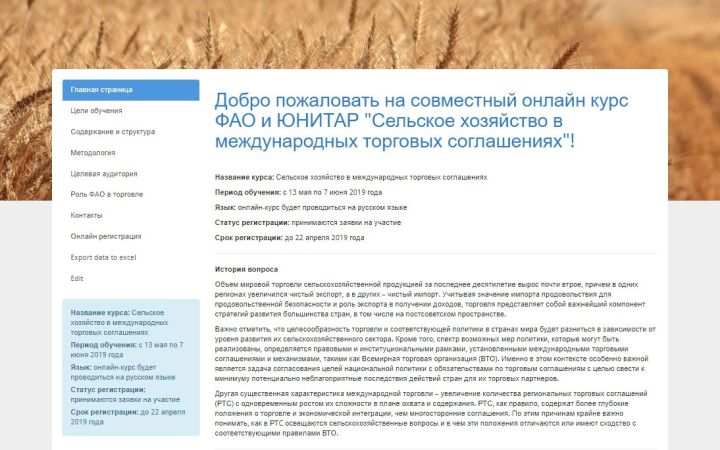4 March 2019, Geneva, Switzerland - UNITAR and the Food and Agriculture Organization of the United Nations (FAO) recently signed an agreement to launch a joint online course on Agriculture in Trade Agreements to be delivered in Russian language for Europe and Central Asia.
The 4-week course will cover global issues as well as key topics with a specific focus on the post-Soviet countries such as regional experiences in implementing multilateral and regional trade agreements in post-Soviet countries.
The course is designed to assist professionals from ministries of agriculture, ministries of economic development and other government and related authorities, who are directly involved in the formulation and implementation of trade or agricultural policies in the 12 post-Soviet countries, namely Armenia, Azerbaijan, Belarus, Kazakhstan, Kyrgyzstan, Georgia, Moldova, Russia, Tajikistan, Ukraine, Uzbekistan and Turkmenistan. Participants from regional and international organizations, the private sector and academia can also benefit from the course.
In the preparation of this course, FAO draws from its extensive experience with providing guidance, capacity building and technical advice to its member countries on the topic of agricultural trade policy and multilateral trade negotiations, as well as its normative work in the framework of international conventions and agreement on the Application of Sanitary and Phytosanitary Measures (SPS agreement).
At the end of the course, participants are expected to be able to better understand the international regulatory frameworks governing trade and its implementation mechanism as well as the eventual implications of the recent WTO Ministerial Conferences; discuss the significance of non-tariff measures (NTMs) on the international trade and the relevance of WTO Agreements regarding such measures on the national trade policies; formulate agricultural trade strategies tailored to trading partners, taking into consideration the differences in treatment of agriculture between the regional trade agreements and multilateral trade agreements.
Global Trade and Agriculture
Global trade in agricultural products has grown almost three-fold in value terms over the past decade with some regions increasing net exports and others increasing net imports. Considering the importance of food imports for food security and the role of exports in generating incomes, trade constitutes an essential component of most countries’ development strategies, including the post-Soviet countries.
Global trade in agricultural products is expected to continue to increase over the coming decades, with countries becoming more engaged in the trade. It is important to note the appropriateness of trade and related policies will differ across countries, depending on their level of agriculture sector development. Also, the range of possible policies that can be implemented follows the legal and institutional frameworks created by international trade agreements and frameworks such as the World Trade Organization (WTO). It is in this context that balancing the achievement of national policy objectives with the obligations under trade agreements to minimize any potential negative effects of countries’ actions on their trading partners is vitally important.
Another significant characteristic of international trade is that the number of regional trade agreements (RTAs) has expanded, with the increased complexity in coverage and content. RTAs tend to establish deeper trade and economic integration provisions than multilateral agreements. Therefore, it is critical to understand how agriculture is addressed in RTAs and what are similarities and differences from the WTO rules.
History of Successful Collaboration
Over the past five years, UNITAR's collaboration with FAO has continued to grow with over a dozen of agriculture and trade-related courses developed and delivered for the benefits of over 1000 beneficiaries globally with a large part coming from Africa and Central Asia.
The course on Agriculture in Trade Agreements is part of FAO’s Regional Initiative for Improving Agri-food Trade and Market Integration in Europe and Central Asia.
Register Now, Limited Slots are available
Limited slots are available in this course and will be subject to a selection process conducted by FAO and UNITAR, taking into account in particular, the geographical distribution and gender balance. A certificate of completion will be issued to participants who successfully complete all course-related assignments and assessments.
For more information and online registration, please visit UNITAR’s website at: http://www.unitar.org/aita-ru (in Russian and English). Registration deadline is 22 April 2019 or while slots are available. Please register early.
About FAO
FAO is a specialized agency of the United Nations that leads international efforts to defeat hunger. The goal is to achieve food security for all and make sure that people have regular access to enough high-quality food to lead active and healthy lives. With over 194-member states, FAO works in over 130 countries worldwide. For more information, visit www.fao.org


